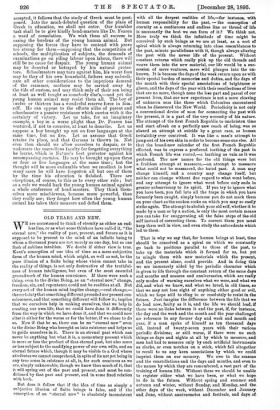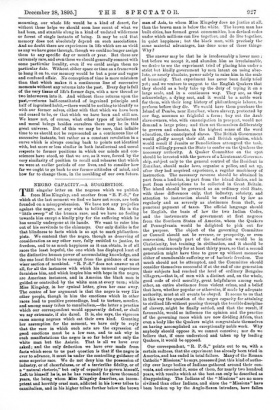OLD YEARS AND NEW.
WE are accustomed to think of eternity as either an end- less line, or as what some thinkers have called it, "the eternal now," the reality of past, present, and future as it is supposed to be present to the mind of an infinite being to whom a thousand years are not merely as one day, but as one flash of sublime intuition. We doubt if either view is true. Kant's conception of our idea of time as a mere subjective form of the human mind, which might, as well as not, be the pure illusion of a finite being whose vision cannot take in the reality of things, is not only destructive of the truthful- ness of human intelligence, but even of the most essential groundwork of the human conscience. If there were such a thing, even to the divine Being, as an "eternal now," change, freedom, sin, and repentance could not be realities at all. But every act of the human mind implies change,—real change,— the certainty that something different preceded our present con- sciousness, and that something different will follow it; implies that we ourselves help in making ourselves, that we help in creating our own life, that we could have done it differently from the way in which we have done it, and that we could now alter it either for the worse or for the better, if we chose to do so. Now if that be so, there can be no "eternal now" even to the divine Being who brought us into existence and helps us to guide ourselves in it. There is an eternal past which can never be anything but what it is, a momentary present which is more or less the product of that eternal past, but also more or leas subject to the modifying power of our own wills, and an eternal future which, though it may be visible to a God whose attributes we cannot comprehend, in spite of its not yet being in any true sense in existence at all, is, for Buell creatures as we are, simply unknowable, though we know thus much of it, that it will spring out of the past and present, and must be con- ditioned by that past and present, and in some fixed relation with both.
But does it follow that if the idea of time as simply a subjective illusion of finite beings is false, and if the conception of an "eternal now" is absolutely inconsistent with all the deepest realities of life,—for instance), with human responsibility for the past, — the conception of eternity as a continuous and endless line or thread of life is necessarily the best we can form of it ? We think not. More truly we think the infinitude of time might be conceived by such beings as we are at least, as a sort of spiral which is always returning into close resemblances to the past, minute parallelisms with it, though always altering the past with the newer life of the present. Without constant returns which really pick up the old threads and weave them into the new material, our life would be a suc- cession of mere ventures, mere wild plunges into the un- known. It is because the days of the weak return upon us with their special burden of memories and duties, and the days of the month with their special associations of brightness or gloom, and the days of the year with their recollections of lives that are no more, though none the less part and parcel of our present lives, that our new experience is not a mere cleaving of unknosen seas like those which Columbus encountered when he discovered the New World. Periodicity is not only a conventional device of man for connecting the past with the present, it is a part of the very necessity of his nature. The attempt of the first French Republic to =christen time and start afresh on a perfectly new reach of being, was as absurd an attempt at suicide by a great race, as human irritability ever contrived. It was like a man's attempt to jump out of his own skin in order to become some one else. All that the brand-new calendar of the first French Republic effected, was to express a profound loathing of the past in which French life was rooted,—a loathing as vain as it was profound. The new names for the old things were but a fruitless attempt at massacre,—an attempt to massacre what could not be massacred, the hated past. A man may change himself, and a country may change itself, but neither can change without due regard to what went before, and any attempt to ignore what went before only ends in greater subserviency to its spirit. If you try to ignore what you have been, you fall into all the traps in which you have formerly been caught, simply because you do not mark them on your chart as the sunken rocks on which you may so easily strike again. The attempt to abolish your old self, whether it be made by a man or by a nation, is only the most certain means you can take for exaggerating all the false steps of the old self instead of correcting them. To correct them you must keep them well in view, and even study the antecedents which led to them.
That is why we say that, for human beings at least, time should be conceived as a spiral on which we constantly go back to positions parallel to those of the past, to take up the materials which it formed for us, but yet to mingle them with new materials which the present, and the present alone, could provide. And in doing this we are immensely aided by the periodic character which is given to life through the constant return of the same days and months and seasons and anniversaries, which are really only modes of warning ourselves what we were, and what we did, and what we knew, and what we loved, in old times, so that we may not lose sight of anything either good or evil, which we hope still to cling to or resolutely to resist in the future. Just imagine the difference between the life that we do lead now, faulty as it is, and the life we should lead, if there were no links between it and the past, if, for instance, the day and the week and the month and the year challenged no reference to any former day and week and month and year, if a man spoke of himself as ten thousand days old, instead of twenty-seven years with their various periodic divisions; or still worse, if there were no such things as days and nights at all by which to measure, and men had had to measure only by such artificial instruments as clocks, or even notches on a stick, which fail altogether to recall to us any keen associations by which we could imprint them on our memory. We owe to the seasons and the constellations and the days and months, and even to the names by which they are remembered, a vast part of the training of human life. Without these we should be unable to register either what we have been, or what we hope to do in the future. Without spring and summer and autumn and winter, without Sunday, and Monday, and the other days of the week, without December and January and June, without anniversaries and festivals, and days of mourning, our whole life would be a kind of desert, for without these helps we should soon lose count of what we had been, and stumble along in a kind of undated wilderness or forest of single instants of being. It may be said that memory does not absolutely depend on such associations. And no doubt there are experiences in life which are as vivid as any we have gone through, though we could no longer assign them to any specific day or month or year. But these are extremely rare, and even these we should generally connect with some particular locality, even if we could assign them no particular date. Without either space or time as a framework to hang it on to, our memory would be but a poor and vague and confused affair. No conception of time is more mistaken than that which makes it a continuous line of successive moments without any returns into the past. Every day is full of the very tissue of life's former days, with a new thread or two interwoven into it. And without these returns upon the past,—returns half-constituted of ingrained principle and half of ingrained habit,—there would be nothing to identify us with our former selves, either with that which we have been and ceased to be, or that which we have been and still are. We know not, of course, what other types of intellectual and moral beings besides ourselves there may be in this great universe. Bat of this we may be sure, that infinite time to us should not be represented as a continuous line of successive instants, but rather as a constant revolution in a curve which is always coming back to points not identical with, but more or less similar in both intellectual and moral respects to former positions in which our minds and con- sciences have stood, so that we are, as it were, forced by the very similarity of position to recall and rehearse that which we were at earlier periods of our lives, and to consider how far we ought to go back to our former attitudes of mind, and how far to change them, in the moulding of our own future.



































 Previous page
Previous page